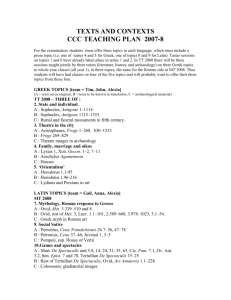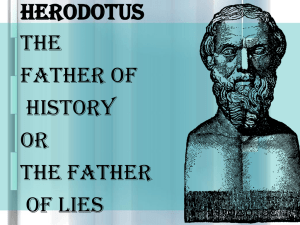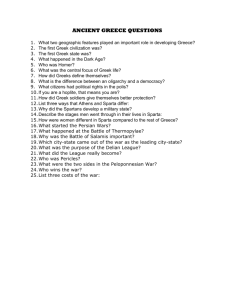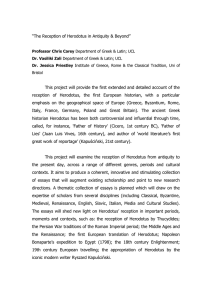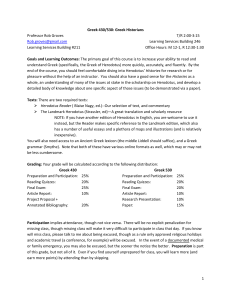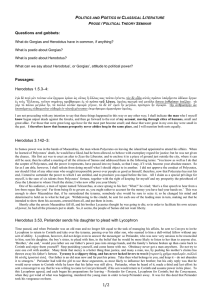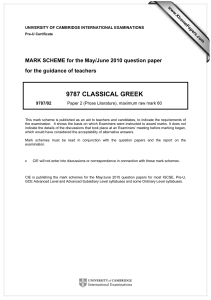Glory that was Greece Part second-0809
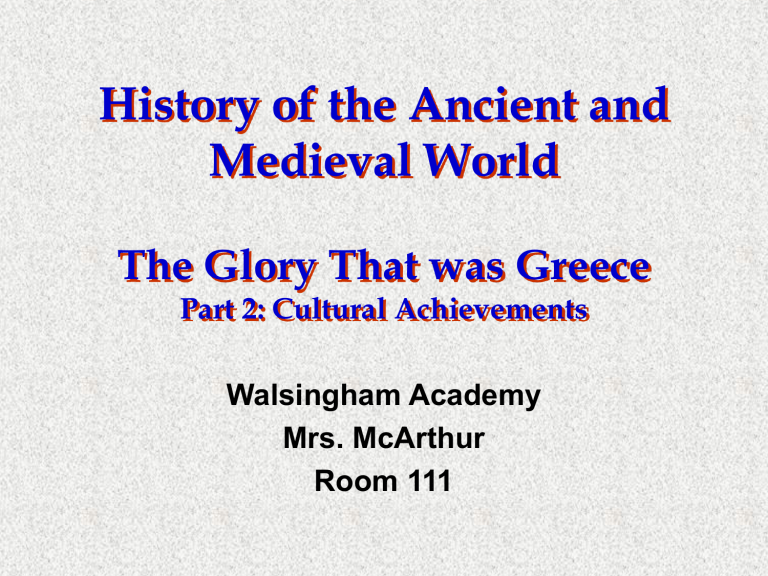
History of the Ancient and
Medieval World
The Glory That was Greece
Part 2: Cultural Achievements
Walsingham Academy
Mrs. McArthur
Room 111
Architecture
:
P ublic and Communal
• growing number of public buildings
• Public buildings increase sense of community (civic) pride and individual’s sense of belonging.
Ironic Factoid : after the destruction of the city by Persians, Athens was rebuilt by raiding the Delian League’s (Greek citystates’ common defense) treasury.
The Parthenon on the Acropolis in Athens
447- 438 B.C.E.
Role of Greek Temple
• Home of individual god/goddess who protected the community
• Not intended for congregational worship
(although activities held in outer enclosure)
• Inside dominated by a cult statue of god and only priests admitted into his/her presence.
(Parthenon = Athena by sculptor, Phideas)
Virtual Field Trip
Acropolis
Floor plan
Home of
Goddess
Athena
Basic Elements of Greek Building
Stylobates : precisely cut squares of stone on which rested the colonnades.
Entablature
“D.I.C.”
Greek Architecture: Columns
More common in
Roman Architecture
“Elgin Marbles”
British Museum,
London
To whom do they belong?
Greek Drama: A Public Art
Theater at Epidauros
2007
Tragedy
An elegant story about an admirable person struggling nobly against insuperable odds.
• Aeschylus
• Sophocles
• Euripides
Antigone at her brother’s grave (Louvre)
What is History?:
Early Definitions
• Mesopotamia + Egypt (a record: Sumerian
King List and tombs)
• Hebrews : a way of revealing the unfolding relationship with God and his chosen people.
• Greeks: a specific literary art – large themes about human life and conduct.
Historiai
• A story with details
• “Researches,” “investigations” about universal themes and absolute truths.
• Drama expressed in powerful language
Herodotus and Thucydides
Frontpiece to 1647 copy of Histories
Herodotus: Father of History
"This, however, I know – that if every nation were to bring all its evil deeds to a given place in order to make an exchange with some other nation, when they had all looked carefully at their neighbors’ faults, they would truly be glad to carry their own back again."
Herodotus
: Traveler and Observer
Oikoumene = “inhabited World:” The World according to Herodotus (450
B.C.E.)
The Persian Wars: As told to us by Herodotus
The Persian Empire: the ultimate barbaron
– uncultured and inferior, albeit powerful
“The Persians are not warlike…
They fight with bows and the short spear and go into battle wearing trousers, and hats on their heads (Herodotus 208).”
These images of the Persian fighters equipped with only the most rudimentary gear must have seemed like suicide to the Greco-Roman reader.
Why History?
(Western tradition)
• To preserve accounts of great deeds.
• To teach “lessons” derived from the past.
• To shape the future’s opinion of one.
Summary
: Herodotus and Thucydides
What was remarkable?
• They were well-read, well-traveled and curious.
• They made hypotheses and applied logic and reason to their subjects.
• They were critical and fair-minded thinkers.
• They “investigated” by questioning, interviewing people and by recording and collating information.
• They were elegant and sometimes entertaining writers.
Assignment 1
1. Read in text, pp. 132-135 and pp. 143.
2. Define 4 blue terms and answer 3 check points.
3. Study PP notes
Extra-Credit Possibility for this week: The Birth of
History: Tues. or Wed. 2:50-3:25
Philosophers
:
Lovers of Wisdom
• What is the main idea of Aristotle’s meditation (thinking)?
• How does Sophocles’ Antigone justify her defiance of King Creon’s orders?
Assignment 2
1. Read text, pp. 130-132 and pp. 136
2. Define 6 Blue-bold terms and answer Thinking Critically , pp 136.
3. Read PP notes and project handout: Classical Greece: Topics of
Investigation. Pick topic and partner(s)
Plato and Aristotle
Pythagoras(?)
(crouching with book)
Zoroaste r (facing, with beard) and
Ptolemy (?) (back to us, globe) and Raphael (?) (dark hair, facing)
The School of Athens
Raphael, 1509
Euclid (?)
Socrates
• Wrote nothing, we know him from pupil, Plato.
• Asked questions (Socratic Method) Why?
• Used logic to seek truth and self-knowledge.
• Why was he tried and condemned to death?
• Why did Socrates choose to die?
• “The unexamined life is not worth living” How did Socrates’ actions support his statement?
Read pp. 131 of text
What is a Good Society?
Plato and Aristotle
Create a chart with a column for each philosopher.
Contrast the views of both. *
Plato Aristotle
1.
2.
1.
2.
*Read pp. 131-132 of text
Assignment 3
1. Project: For choices, description and rubric, see handout: Classical Greece:
Topics of Investigation.
2. Presentations: Monday, Nov. 3.
Note: Chapter Test, Friday, Nov. 7
